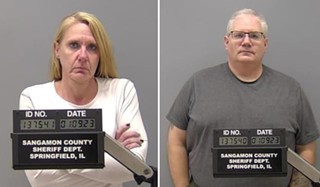LifeStar Ambulance Service paramedic Peggy Finley called the Springfield police officer, Jacob Wayda, and suggested Wayda tell officials at HSHS St. John’s Hospital that Moore, 35, was “responsive” at his home and was a “different patient” between the time he was picked up by ambulance to when he arrived at St. John’s.
State’s Attorney Dan Wright said in documents filed Jan. 31 in Sangamon County Circuit Court that Finley told a St. John’s official in a recorded call that Moore was “slightly combative” and “confused” at his Springfield home when Finley and LifeStar emergency medical technician Peter Cadigan arrived there at 2:18 a.m. Dec. 18. Cadigan also has been charged with first-degree murder in the case.
Wright said body camera footage from police at the scene “removes any doubt that Moore’s behavior was the opposite of ‘combative’ and, to the contrary, showed a man in a weakened and confused state of mental distress, unable to walk, and in desperate need of specialized medical care that the defendants were trained to provide.”
Once Finley and Cadigan brought Moore to St. John’s – a few minutes after he was strapped into a stretcher face-down about 2:25 a.m. – Moore was “unresponsive” and not breathing, Wright said. Despite efforts to resuscitate Moore, he was pronounced dead at the hospital at 3:14 a.m. Dec. 18.
A forensic pathologist has ruled that Moore died of compressional and positional asphyxia because of being placed face-down on the stretcher and transported to the hospital with straps tightened across his back. A “patient restraint policy” set by Memorial Health, the organization that oversees medical care provided by for-profit LifeStar, says patients should never be transported in the prone position, or face down.
Moore, a Black man, was cared for by the two white emergency medical system workers in a case that has drawn international attention because of allegedly rude and dismissive treatment by Finley and Cadigan.
Nationally known civil rights attorney Ben Crump, who is representing Moore’s family in a wrongful death lawsuit against Finley, Cadigan and LifeStar, has said the case may be the first nationwide in which EMS workers have been charged with murder in connection with their handling of a call for help.
Finley and Cadigan have pleaded not guilty and are being held on $1 million bond in the Sangamon County Jail. They are expected to appear in court Feb. 6 when their attorneys will ask Circuit Judge Robin Schmidt to reduce their bond enough so they can post bail and be released before trial.
Wright’s recent court filing asks that attorneys for Finley and Cadigan be barred from raising “incorrect and misleading statements of law” in the future after their statements at a Jan. 20 preliminary hearing in the case.
“Counsel should not be permitted to further advance false statements of law which could confuse and mislead potential jurors,” Wright wrote.
Wright said in court documents that Finley’s and Cadigan’s alleged “series of false statements” to hospital staff and Illinois State Police were evidence of “consciousness of guilt.”
The evidence, Wright said, backs up the first-degree murder charge against Finley, 44, and Cadigan, 50, both Springfield residents.
When asked to respond to Wright’s motion, Springfield lawyer W. Scott Hanken, who is representing Finley, said, “I disagree with it completely.” Hanken said the legal arguments Wright presented “were about as big a stretch” as Wright’s stated legal basis for justifying the murder charges.
Wright’s allegations involving Moore’s death would be more appropriate for a civil lawsuit alleging medical malpractice and don’t justify criminal charges, Hanken said.
Circuit Judge Raylene Grischow ruled Jan. 20 there was probable cause to charge Finley and Cadigan with murder.
Hanken requested in court documents that Finley’s bond be reduced from $1 million to $100,000 so the family of the mother of four and grandmother of six could post 10%, or $10,000, and she could be released while her case proceeds in court.
He said Finley “should not be forced to endure deprivation of her liberty” while prosecutors proceed with “an overreaching and novel attempt to turn presumed negligence into first-degree murder.”
Hanken noted that Memorial Health, in early January, reviewed the circumstances surrounding Moore’s death and ordered Finley to receive a 90-day suspension of her EMS credentials, complete a test and undergo additional education.
“The very acts that are alleged herein as constituting a crime were deemed to be deserving of only a suspension with further remedial training by the very entity statutorily and specifically charged with monitoring and disciplining paramedics, EMTs and other participants in the Memorial EMS System,” Hanken said.
A Memorial Health spokesperson declined comment on the case. Hanken wouldn’t comment on new details of the EMS workers’ alleged conduct contained in the filing, saying he hasn’t yet received all of the evidence collected by prosecutors – information that must be provided to defense attorneys. As a result, Hanken said, prosecutors “can spin it any way they want.”
Belleville lawyer Justin Kuehn, one of Cadigan’s attorneys, declined to comment on Wright’s most recent filing or other aspects of the case.
The murder charges say the EMS workers “did acts without lawful justification” that caused Moore’s death and that the workers knew, based on their “training, experience and the surrounding circumstances” that their acts “would create a substantial probability of great bodily harm or death.” After Moore’s death, Finley “falsely claimed to the Illinois State Police that she took Moore’s vitals during transport from the scene,” but hospital staff said no vitals were provided by Finley or Cadigan, according to Wright.
Wright said in court documents that Finley, in the recorded call to St. John’s, said she was not “messing with vitals” before Moore was transported because she “did not want to ‘poke the bear.’”
Accompanying Wright’s motion was a copy of a text message from Finley to Cadigan and another person a few hours after Moore’s death that said: “My fuckup was not having (Springfield police) flip him over on his back, and transporting him prone. And that was MY fuckup!!! I take complete responsibility for that. But he was alive when we got him to the ER!!!”




















